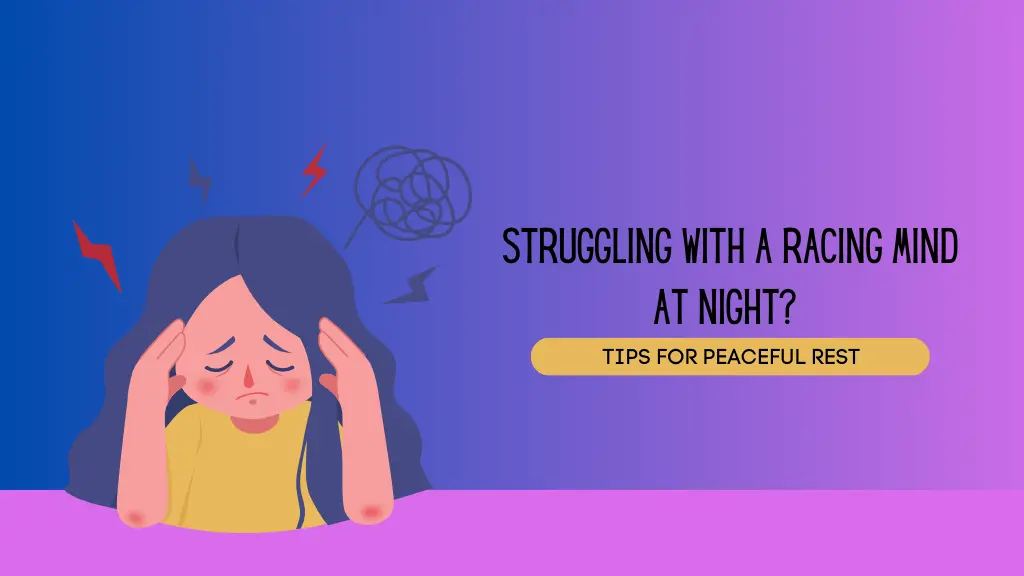A racing mind can feel like an enemy when it’s time to sleep. Thoughts keep swirling, worries intensify, and it becomes nearly impossible to drift into the peaceful slumber your body craves. If you often find yourself staring at the ceiling, unable to turn off your thoughts, you are not alone.
Luckily, there are ways to calm a racing mind and prepare your body for rest. In this article, we’ll explore effective techniques to quiet your thoughts and improve your sleep quality.
You May Also Like: Acne Face Mapping Can Tell You About Your Skin
Why Does Your Mind Race at Night?
Before we discuss how to calm your mind, it’s helpful to understand why it races in the first place. Here are a few common reasons:
- Stress and Anxiety: Work, relationships, or personal challenges can lead to racing thoughts at night. When stress levels are high, your mind tends to replay events or focus on what might happen.
- Overstimulation: Using electronics or consuming caffeine late in the day can activate your brain, making it hard to unwind.
- Overthinking: Your brain may start processing everything at once, creating a mental “to-do” list for the future.
- Circadian Disruption: A disrupted sleep cycle or poor sleep hygiene can contribute to restless nights.
1. Establish a Sleep Routine
One of the most effective ways to calm a racing mind is to establish a consistent bedtime routine. When your body knows it’s time to wind down, it naturally begins to prepare for rest. Try these tips to improve your sleep routine:
- Set a Regular Bedtime: Go to bed at the same time every night. This helps regulate your circadian rhythm and signals to your body that it’s time to rest.
- Create a Relaxing Environment: Dim the lights, lower the temperature in your bedroom, and eliminate any distractions. Keep your room dark, quiet, and cool to create a peaceful atmosphere.
- Limit Stimulants: Avoid caffeine, nicotine, or heavy meals before bed. These can increase your heart rate and keep you awake.
2. Practice Mindfulness and Meditation
Mindfulness is a technique that involves focusing on the present moment and accepting your thoughts without judgment. It’s an effective way to stop your mind from racing and reduce stress. Here’s how to use mindfulness to calm your thoughts before bed:
- Breathing Exercises: Deep breathing can signal your body to relax. Try inhaling for a count of four, holding for four, and exhaling for four. Repeat this process several times.
- Body Scan Meditation: Focus on each part of your body, starting from your toes and working your way up to your head. Pay attention to any tension and consciously relax those areas.
- Guided Meditation Apps: Apps like Calm, Headspace, or Insight Timer offer guided meditations designed to help you relax and drift off to sleep.
3. Try Progressive Muscle Relaxation (PMR)
Progressive Muscle Relaxation (PMR) is a technique where you tense and then relax different muscle groups in your body. This practice helps release physical tension and calms the nervous system. Here’s how to practice PMR:
- Start with your toes. Tighten the muscles as much as you can for 5-10 seconds, then slowly release.
- Move to your feet, then legs. Work your way up your body, focusing on each muscle group.
- End with your face. Tense your face muscles, including your jaw and eyes, and then release.
By practicing PMR, you’ll help your body unwind, and your mind will follow.
4. Journaling to Clear Your Mind
Sometimes, writing down your thoughts can help alleviate anxiety and stop a racing mind. If your mind is full of worries, write them down in a journal before bed. This can help you release the thoughts you’re holding onto.
Try writing about:
- What’s on your mind: List any worries or concerns.
- Gratitude: Write down things you’re thankful for. This shifts your focus from stress to positivity.
- Your to-do list for tomorrow: Writing it down can give you a sense of control, which helps your mind feel more relaxed.
By putting your thoughts on paper, you can stop mentally rehearsing them over and over.
5. Limit Screen Time Before Bed
Using electronic devices like phones, tablets, and computers late at night can make it harder to sleep. The blue light emitted by screens interferes with the production of melatonin, a hormone that helps regulate your sleep-wake cycle.
To improve your sleep:
- Turn off screens at least 30-60 minutes before bed.
- Avoid checking emails or social media that might trigger stress or anxiety.
- Read a book or listen to calming music instead to relax.
6. Use Aromatherapy
Certain scents can have a calming effect on the mind and help improve sleep quality. Aromatherapy is a natural way to promote relaxation and prepare your body for rest. Try these options:
- Lavender: Known for its calming properties, lavender can help reduce anxiety and improve sleep.
- Chamomile: Chamomile oil or tea can help you relax before bed.
- Ylang Ylang: This floral scent has been shown to reduce stress and promote calm.
Use essential oils in a diffuser, or apply a few drops to your pillow for a soothing effect.
7. Cognitive Behavioral Therapy for Insomnia (CBT-I)
Cognitive Behavioral Therapy for Insomnia (CBT-I) is a therapeutic approach that helps you identify negative thought patterns that disrupt sleep. It’s highly effective for those struggling with sleep anxiety or chronic insomnia.
A CBT-I therapist can teach you techniques to challenge the thoughts that keep you awake. You’ll learn how to shift your mindset and improve your sleep quality.
8. Avoid Overthinking and Catastrophizing
If your mind starts racing with negative thoughts, try to catch yourself before you spiral. Overthinking and catastrophizing can keep you awake all night. Instead of focusing on what might go wrong, try to shift your attention to more positive or neutral thoughts.
One technique to combat overthinking is to practice “thought-stopping”. When you notice negative thoughts, mentally say “stop” and redirect your attention. This can help break the cycle of worry.
Conclusion
A racing mind can be frustrating, especially when you’re trying to get a good night’s sleep. But with the right tools and techniques, you can quiet your thoughts and improve your sleep quality.
By establishing a bedtime routine, practicing mindfulness, using relaxation techniques, and reducing stress, you can train your mind to relax. The more you practice these strategies, the easier it will be to unwind and drift into a restful sleep.
Remember, if sleep problems persist, it’s important to speak with a healthcare professional. They can help determine if there’s an underlying condition that needs to be addressed.
Now that you know how to quiet a racing mind, put these techniques into action tonight for better sleep and a more restful tomorrow.











[…] You May Also Like: Struggling with a Racing Mind at Night? […]